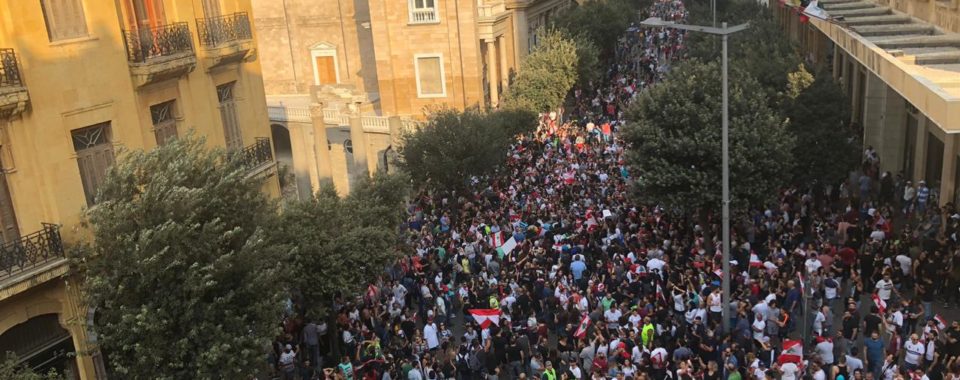BY RUTH SIMPSON – INTERNATIONAL ALERT
International Alert is a peacebuilding charity that has worked for 30 years to lay the foundations for lasting peace in communities affected by violent conflict.
Since the nationwide protest movement that swept the country in October 2019, Lebanon – the country and its people – has been experiencing intersecting economic, political and security crises. The volatility of these interwoven dynamics has been exacerbated by the COVID-19 health crisis and the devasting Beirut Seaport Blast of 4 August 2020. In parallel, relations between Lebanese of different backgrounds deteriorated significantly along with relations between the Lebanese and refugees.
These concurrent political, economic, security and health crises have had devastatingly real impacts on people’s safety, livelihoods, and dignity, especially for the most vulnerable Lebanese and refugee families, as well as jeopardising the country’s stability. This is borne out in FSI’s data, with Lebanon being ranked fifth in terms of the biggest decline in fragility across several key political, economic, and social indicators, which have deteriorated since last year and point to a pattern of long-term decline.
The steep economic downturn and the devaluation of the Lebanese lira by over 85% has pushed more than fifty percent of the population below the poverty line.1 Already vulnerable refugees are suffering further precarity, with an estimated 90% of Syrian refugee families living in extreme poverty.2 In the face of economic despair, young professionals with networks and the means seek employment elsewhere, whilst young people and workers from disadvantaged groups – Lebanese and non-Lebanese – resort to risking their lives in perilous journeys on boats to Cyprus.3 Both trends underscore the hopelessness felt by young people seeking to make a future for themselves and the loss to the country as part of a seemingly unabating brain drain.4 This rising economic insecurity has led to an increase in incidents of theft, petty crime and harassment5 as negative coping mechanisms to the worsening livelihood conditions.
In the context of growing economic inequalities and the stresses of simply trying to survive day-to-day, social tensions are on the rise. In Lebanon, since the beginning of the Syria crisis, discourse around social stability has widely focused on tensions between Syrian refugees and Lebanese communities, on issues relating to perceived and actual competition over access to services and resources and disparities in access to aid. The COVID-19 crisis has re-ignited tensions over health services that pre-dated the pandemic, such as issues relating to access to treatment or medications. Tensions over access to and quality of water, particularly in the Litany River in the Bekaa, also continue.
However, some of the most concerning trends, relate to rifts between Lebanese. Gender, class and age are all points of division among communities6 in Lebanon that are often triggered by unresolved memories from the civil war. The past year has seen the resurgence of political divisions in the context of escalating geopolitical tensions7 after such divisions were momentarily overtaken by the socioeconomic demands of the October protests.
Whilst political and sectarian divisions are most often in the spotlight, with the economic crisis, class divisions and socio-economic marginalisation are increasingly coming to the fore. Evidence from International Alert’s analysis shows that women and young people coming from lower socioeconomic classes and peripheral areas feel disenfranchised from meaningful participation in social and economic life. Additionally, they hold increasingly negative perceptions about their future prospects,8 accompanied by a sense of hopelessness around their ability to affect positive change in their lives. This limits opportunities for cross-community and intergenerational dialogue and reduces the capacity of community groups to build bridges across divides and work towards collective goals.
As with tensions in the streets, online communities are increasingly atomised and reflect growing polarisation. Misinformation and harassment are increasing on social media, further fuelling tensions, with spaces for freedom of expression shrinking.9
Despite the negative outlook and continuing economic meltdown, there is widespread recognition that the economic model adopted for decades needs to change.10
With increased public mobilisation following the October 2019 demonstrations and the emergence of active community-based and grassroots networks, there are openings for positive and peaceful change. At the community level, local CSOs, women’s networks and youth groups across the country mobilised to provide support following the Beirut Blast. They also provided urgent assistance to vulnerable families, developed initiatives to contain community tensions and tackled COVID-19 misinformation. The October movement highlighted reinvigorated engagement amongst community-based networks and provided new opportunities to open discussions around the meaningful role previously marginalised groups can play, especially at the community and grassroots level.
Local solidarity initiatives can play a part in recovery11 if these local networks are supported and sustained beyond the immediate aftermath of these crises. Opportunities for bottom-up participation should be fostered and new spaces created to connect these initiatives up with formal local and national mechanisms. To capitalise on local solidarity, it is critical that these efforts engage an inclusive and diverse range of participants, men and women of different generations, nationalities, locations and class backgrounds, as well a local community leaders and authorities.
Despite the huge technical, resourcing and fiscal challenges12 facing municipalities, there is an opening for civil society to contribute to improving relationships between municipalities and local communities through developing the capacities of municipalities in good governance that take into account principles of transparency and accountability, and that use methods of community engagement and participatory planning.
Entry points for recovery and positive action may seem small, but in a rapidly changing context it is crucial to seize opportunities to support community-based initiatives and solidarity efforts that (re)build social ties and social trust as they emerge.
Acknowledgments
With inputs from Aseel Naamani, Programmes Manager, International Alert Lebanon. This article drew on analyses by independent research consultants Zeina Abla, Muzna Al Masri and Rana Hassan.
Endnotes
1. https://www.unescwa.org/news/Lebanon-poverty-2020
2. https://www.unhcr.org/lb/14025-nine-out-of-ten-syrian-refugee-families-in-lebanon-are-now-living-in-extreme-poverty-un-study-says.html
3. https://www.reuters.com/article/us-lebanon-crisis-migrants-cyprus-idUSKBN2691NP
4. https://www.reuters.com/article/us-lebanon-crisis-brain-drain-idUSKCN24M1FW
5. https://www.france24.com/en/20200715-hunger-crimes-on-the-rise-in-crisis-hit-lebanon
6. https://www.international-alert.org/publications/envisioning-and-contesting-new-lebanon-october-protests
7. https://www.international-alert.org/sites/default/files/Lebanon-Context-Analysis-Feb-Jul-EN-2021.pdf
8. https://www.international-alert.org/news/lebanon-one-year-on-october-protests
9. https://rsf.org/en/lebanon
10. https://www.international-alert.org/sites/default/files/Lebanon-Context-Analysis-Feb-Jul-EN-2021.pdf
11. https://www.opendemocracy.net/en/north-africa-west-asia/in-the-absence-of-the-state-people-are-leading-beiruts-recovery/
12. https://carnegie-mec.org/2020/09/16/marginalization-cost-regional-disparities-fueling-lebanon-s-fragility-pub-82714
Image licensed under Creative Commons Attribution-Share Alike 4.0 International license.
